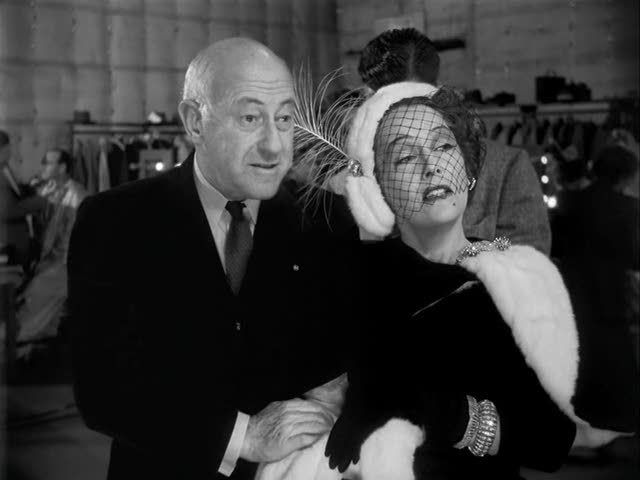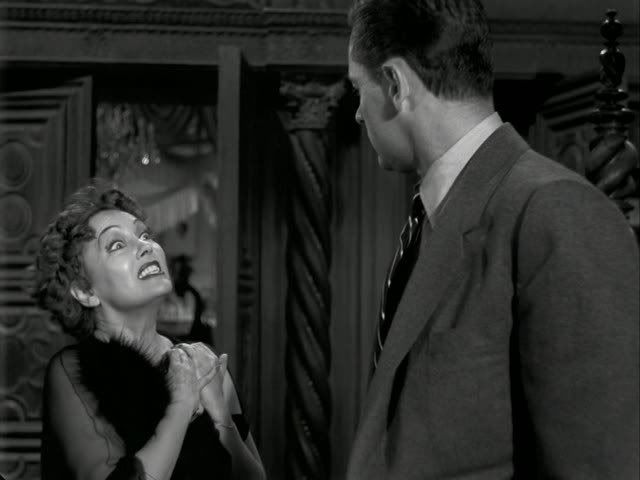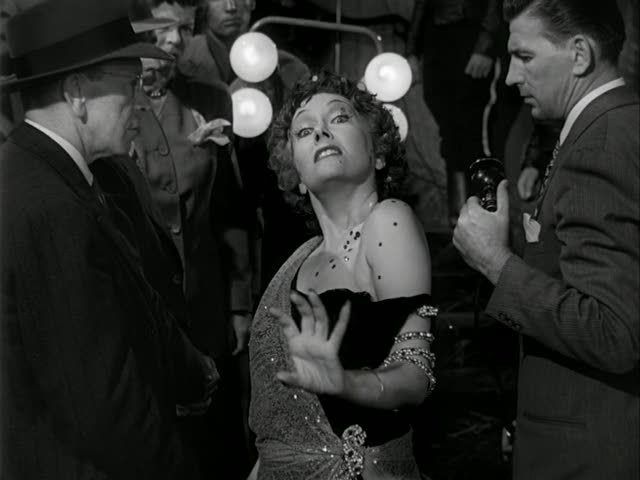

Sunset Boulevard's Norma Desmond (Gloria Swanson) is quite possibly the greatest of Hollywood cinema's many self-parodic characters. Norma is an antique of the silent age, one of the many great stars of the silent era who, too invested in the expressive melodramatics and gestural acting of silent cinema, simply could not make the transition to sound. If anything, though, Billy Wilder's darkly comic masterpiece only proves that silent film's acting conventions work just as well in the sound era, lending some credence to Norma's grand pronouncement, "I'm still big, it's the pictures that got small." Swanson's Norma is a sad, creepy creation, stalking through the film with her hands twisted up into Nosferatu-like claws, a true (silent) movie monster. She's obsessed with the past, and she sees her second chance in down-on-his-luck screenwriter Joe Gillis (William Holden), who's broke and ready to give up on his Hollywood dreams altogether when he accidentally becomes involved with Norma. The cynical Gillis sees in her a chance for money and comfort, even though he knows her ludicrous proposed script, a lavish Egyptian fantasy she's been crafting for Cecil B. DeMille, has no chance of getting off the ground.
This is certainly one of the great Hollywood satires, a moving ode to those figures left behind in the wake of progress, including the director Erich von Stroheim, who appears as Norma's former lover and director, now reduced to her doting, eternally loyal butler — an arc that mirrors Stroheim's own fall from Hollywood's graces. By the same token, Wilder inserts cameos of several prominent real-life actors whose careers really were, like Norma's, sabotaged by the dawn of sound: Buster Keaton, Anna Q. Nilsson and H.B. Warner. But the heart of the film is Norma herself, mad and exaggerated and yet compulsively watchable, even her dementia reminding us of the power of gesture, of the way silent actors relied on their faces, communicating physically rather than verbally. Norma's constantly performing, whether she's donning Charlie Chaplin drag to do a silent comedy bit or exploding into teary melodramatics. She's always on screen in her mind, always in character, always ready for her closeup.


















Nice review. It's been a while since I've seen it and will inevitably have to re-watch it. Of course it inspired Fassbinder's 'Veronika Voss', still one of his finest works, although one wonders if that's less a critique of German film-making than a critique of German society based on the myth of the economic miracle, a recurring theme throughout his films.
ReplyDeleteThanks Kevin. I love Veronika Voss too, it's arguably one of Fassbinder's best, (though for me that's such a long list that it's almost easier to just list the ones I don't like). I think Fassbinder was definitely critiquing German society; one of the recurring themes of his work is exposing the truth behind the lies that societies tell themselves.
ReplyDeleteThe scene with Bill Holden in the pool, is still one of the most brilliant shots in movie history.
ReplyDeleteWhat a truly classic film in every sense of the word. And even more: It's a perfect film. Yes, perfect. I don't apply that word often, but it fits here.
ReplyDeleteI don't think you'd get any argument if you removed the "quite possibly" from your opening sentence. She's an icon for a reason.
ReplyDeleteSebina, agreed about that pool shot, which is a really haunting image.
ReplyDeleteJason, I can't really disagree about this film being "perfect." Wilder is hit or miss for me, but this is definitely his absolute best.
TVF, you're probably right. She's definitely an icon, very quotable and memorable.
Ed, I have argued with others for years that this is his BEST film with DOUBLE INDEMNITY and ACE IN THE HOLE fans. There are all the reasons in the world why this is a fact in my mind, and you have captures it persuasively here in your stellar capsule essay.
ReplyDeleteIn a poll of the greatest performances of all-time by an actress in a female role, I voted Gloria Swanson's performance here as second greatest behind Rene Falconetti's in Dreyer's PASSION OF JOAN OF ARC, but some would argue that one shouldn't mix silent with 'talkie' performance. Still, I wanted to measure my perception of what I thought to be true greatness in screen acting.
I couldn't agree with you more here.
Ha! I said "actress in a female role" above!! LOL!!!!!!! I am losing it. I meant to say "leading role."
ReplyDeleteI'm ***red faced***
The Paramount Collection edition has a special feature showing the original, cut after first viewing, opening.
ReplyDeleteWhy Billy Why would you cut this prelude?
A tad long perhaps; but silently introduce us to the story, make us watch the black back end of a coroner's van (Charion's boat), drag us chest deep scarringly along the rough asphalt streets (Styx), show that we are in for a bumpy ride.
Exit after the "men in white" wheel a gurney, around the corner, into oblivion where someone belongs.
Re-enter via; his street, his apt, his white robe and then his dialoge.
imho Neah
Fascinating, Neah. I'd never heard about the cut prologue before, and frankly the more familiar introduction to the film is just about as perfect as I could imagine. But I'd be very curious to see the longer intro, I'll have to check it out. Thanks for bringing that up!
ReplyDeleteI have often remarked that this is the Greatest Film Ever Made. The usual culprit for that title, Citizen Kane, is brilliant in its own way but mostly in ways that only appeal to cineastes; Sunset Blvd has a broader appeal yet is just as brilliant. It's as fascinated with Hollywood as any moviegoer could be, and is revealing of that town's peccadillos in ways that everyone can relate to. The cinematography is as gorgeous as any ever seen. Brilliance unsurpassed all round.
ReplyDelete